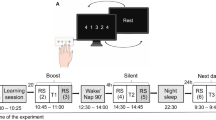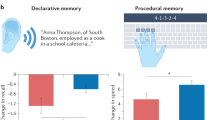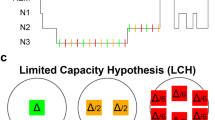Abstract
Historically, the term ‘memory consolidation’ refers to a process whereby a memory becomes increasingly resistant to interference from competing or disrupting factors with the continued passage of time1. Recent findings regarding the learning of skilled sensory and motor tasks (‘procedural learning’) have refined this definition, suggesting that consolidation can be more strictly determined by time spent in specific brain states such as wake, sleep or certain stages of sleep2,3,4,5,6,7,8. There is also renewed interest9 in the possibility that recalling or ‘reactivating’ a previously consolidated memory renders it once again fragile and susceptible to interference10,11,12, therefore requiring periods of reconsolidation13,14,15. Using a motor skill finger-tapping task, here we provide evidence for at least three different stages of human motor memory processing after initial acquisition. We describe the unique contributions of wake and sleep in the development of different forms of consolidation, and show that waking reactivation can turn a previously consolidated memory back into a labile state requiring subsequent reconsolidation.
This is a preview of subscription content, access via your institution
Access options
Subscribe to this journal
Receive 51 print issues and online access
$199.00 per year
only $3.90 per issue
Buy this article
- Purchase on Springer Link
- Instant access to full article PDF
Prices may be subject to local taxes which are calculated during checkout




Similar content being viewed by others
References
McGaugh, J. L. Memory—a century of consolidation. Science 287, 248–251 (2000)
Muellbacher, W. et al. Early consolidation in human primary motor cortex. Nature 415, 640–644 (2002)
Brashers-Krug, T., Shadmehr, R. & Bizzi, E. Consolidation in human motor memory. Nature 382, 252–255 (1996)
Karni, A., Tanne, D., Rubenstein, B. S., Askenasy, J. J. & Sagi, D. Dependence on REM sleep of overnight improvement of a perceptual skill. Science 265, 679–682 (1994)
Smith, C. & MacNeill, C. Impaired motor memory for a pursuit rotor task following Stage 2 sleep loss in college students. J. Sleep Res. 3, 206–213 (1994)
Stickgold, R., James, L. & Hobson, J. A. Visual discrimination learning requires sleep after training. Nature Neurosci. 3, 1237–1238 (2000)
Walker, M. P., Brakefield, T., Morgan, A., Hobson, J. A. & Stickgold, R. Practice with sleep makes perfect: Sleep dependent motor skill learning. Neuron 35, 205–211 (2002)
Walker, M. P., Brakefield, T., Hobson, J. A. & Stickgold, R. Sleep and the time course of motor skill learning. Learn. Mem. 10, 275–284 (2003)
Nader, K. Memory traces unbound. Trends Neurosci. 26, 65–72 (2003)
Misanin, J. R., Miller, R. R. & Lewis, D. J. Retrograde amnesia produced by electroconvulsive shock after reactivation of a consolidated memory trace. Science 160, 554–555 (1968)
Rubin, R. D. Clinical use of retrograde amnesia produced by electroconvulsive shock. A conditioning hypothesis. Can. Psychiatr. Assoc. J. 21, 87–90 (1976)
Gordon, W. C. & Spear, N. E. The effects of strychnine on recently acquired and reactivated passive avoidance memories. Physiol. Behav. 10, 1071–1075 (1973)
Nader, K., Schafe, G. E. & Le Doux, J. E. Fear memories require protein synthesis in the amygdala for reconsolidation after retrieval. Nature 406, 722–726 (2000)
Debiec, J., LeDoux, J. E. & Nader, K. Cellular and systems reconsolidation in the hippocampus. Neuron 36, 527–538 (2002)
Milekic, M. H. & Alberini, C. M. Temporally graded requirement for protein synthesis following memory reactivation. Neuron 36, 521–525 (2002)
Fischer, S., Hallschmid, M., Elsner, A. L. & Born, J. Sleep forms memory for finger skills. Proc. Natl Acad. Sci. USA 99, 11987–11991 (2002)
Goedert, K. M. & Willingham, D. B. Patterns of interference in sequence learning and prism adaptation inconsistent with the consolidation hypothesis. Learn. Mem. 9, 279–292 (2002)
Pace-Schott, E. F. & Hobson, J. A. The neurobiology of sleep: Genetics, cellular physiology and subcortical networks. Nature Rev. Neurosci. 3, 591–605 (2002)
Hobson, J. A. & Pace-Schott, E. F. The cognitive neuroscience of sleep: Neuronal systems, consciousness and learning. Nature Rev. Neurosci. 3, 679–693 (2002)
Acknowledgements
We thank B. Kocsis, E. Pace-Schott and R. Fosse for comments regarding the study. This research was supported by the National Science Foundation and the National Institute of Mental Health.
Author information
Authors and Affiliations
Corresponding author
Ethics declarations
Competing interests
The authors declare that they have no competing financial interests.
Rights and permissions
About this article
Cite this article
Walker, M., Brakefield, T., Allan Hobson, J. et al. Dissociable stages of human memory consolidation and reconsolidation. Nature 425, 616–620 (2003). https://doi.org/10.1038/nature01930
Received:
Accepted:
Issue Date:
DOI: https://doi.org/10.1038/nature01930
This article is cited by
-
Early excitatory-inhibitory cortical modifications following skill learning are associated with motor memory consolidation and plasticity overnight
Nature Communications (2024)
-
Training-related changes in neural beta oscillations associated with implicit and explicit motor sequence learning
Scientific Reports (2024)
-
Assessing User Experiences in Virtual Reality Learning Environments
The Asia-Pacific Education Researcher (2024)
-
Time of day and sleep effects on motor acquisition and consolidation
npj Science of Learning (2023)
-
Oxytocin vs. placebo effects on intrusive memory consolidation using a trauma film paradigm: a randomized, controlled experimental study in healthy women
Translational Psychiatry (2023)
Comments
By submitting a comment you agree to abide by our Terms and Community Guidelines. If you find something abusive or that does not comply with our terms or guidelines please flag it as inappropriate.



